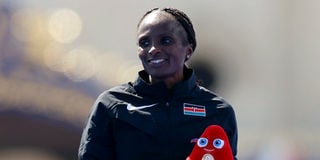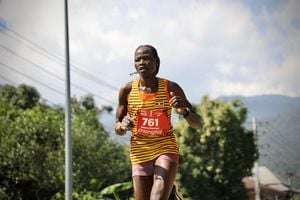Obiri soldiers on for bronze after bad fall, Dutchwoman Sifan peerless in victory

Hellen Obiri of Kenya celebrates on the podium while holding the Olympics mascot the Phryges during the women's marathon medal ceremony in Paris on August 11, 2024.
What you need to know:
- Besides her Olympic silver medals, Obiri has four world titles, winning the 5,000m at the 2017 and 2019 World Championships, the 3,000m at the 2012 World Indoor Championships and the 2019 World Cross-Country Championships.
- “We tried to do some teamwork. It is a marathon. After 2k, I fell down. And after 20k, I was trying to pick my water, (and) again I fell down. I missed my two water stations, so that was a challenge for me. I had to ask someone to give me some water,” Obiri explained.
In Paris
Boston Marathon’s infamous “Heartbreak Hill” measures only about 27 vertical metres, but its steady rise 32 kilometres into the race forces clenched fists, gritted teeth and moans of distress out of even the most experienced of runners.
Run on Patriots’ Day each year, the Boston Marathon is the world’s oldest annually-run marathon at 129 years and is usually won or lost at “Heartbreak Hill”, a sector appropriately named for having broken many a runner’s hearts.
Kenya’s Hellen Obiri has conquered “Heartbreak Hill” not once, but twice in her stellar career that has seen her win back-to-back Boston Marathon titles, last year in a personal best time of two hours, 21 minutes and 38 seconds, and this year in 2:22:27.
But Sunday's Paris Olympic Games marathon was a totally different proposition for the Laikipia Air Base soldier with two punishing climbs rudely - some say maliciously - choreographed into the scenic route, turning dreams of many athletes into nightmares.
The hills show up at kilometre 19 at Versailles - the principal residence of the French kings from the time of Louis XIV to Louis XVI - and at 29km around Meudone, an area known for offering laundering services in the 19th century.
Bahrain’s 2017 world champion Rose Chelimo called the climbs “more heartbreaking than Heartbreak Hill” while Romania’s Kenya-born Delvine Meringor said the steep climbs and sharp descents consumed all the gas she had.
Fellow Kenya-born Romanian Joan Chelimo also described the course as punishing.
She was forced to drop out with an Achille’s injury just before the first climb, with Kenya’s defending champion Peres Jepchirchir also struggling.
“This course is better for trail-running, not the marathon,” quipped Joan as she walked through the media mixed zone.
Besides the hills, it was Obiri’s most challenging marathon ever as she fell twice and had to take a break at some point to throw up after stomach discomfort.
Obiri was looking to add an Olympic marathon gold medal to her rich collection that has silvers in the 5,000 metres in Rio de Janeiro (2016) and Tokyo (2021), but was forced to settle for bronze in 2:23:10 behind indefatigable Dutchwoman Sifan Hassan, who panned gold in an Olympic record 2:22:55, with Ethiopia’s world record holder Tigst Assefa (WR 2:11:53) taking silver in 2:22:58.
The soldier she is, Obiri fought gallantly, recovering from two bad falls at 2km and 20km to attach herself back onto the leading group of Sifan, Tigist and compatriot Sharon Lokedi, setting up four-way sprint battle two kilometres to the finish.
Sifan disengaged from the group and went for the jugular, sprinting onto the blue carpet like a woman possessed and on to the finish line outside Les Invalid, the iconic structure housing museums on French military history alongside a hospital and old soldiers’ retirement home, not exactly the place soldier Obiri, who is attached to the Kenya Air Force, would have loved to retire her hopes for gold.
So grueling was the course that the final runner to finish – Kinzang Lhamo of the Kingdom of Bhutan – came home in three hours, 52 minutes and 59 seconds.
It was further disappointment for Kenya to fail to win the men’s and women’s marathons having claimed double gold in 2016 (Eliud Kipchoge, Jemima Sumgong) and Tokyo in 2021 (Eliud Kipchoge and Peres Jepchirchir).
Treble chasing Sifan, a three-time Olympic medallist from Tokyo (gold in 5,000m and 10,000m, bronze in 1,500m), had already claimed two bronze medals at Paris 2024, in the 5,000m and 10,000m and was looking to cement a campaign with gold, which she did in spectacular fashion.
“I have no words. Every moment in the race I was regretting that I ran the 5,000m and 10,000m. I was telling myself if I hadn’t done that, I would feel great today,” Sifan reacted after Sunday’s race, adding that the gold medal was like a dream to her.
“From the beginning to the end, it was so hard. Every step of the way. I was thinking, ‘Why did I do that? What is wrong with me?’ If I hadn’t done it, I would feel so comfortable here.
“The moment I started to feel good at 20km, I felt so good. Then I knew I wanted gold. But everybody else was fresh and all I was thinking was, ‘When are they going to break? They’re going to go hard, they’re going to go hard'.
“I feel like I am dreaming. I only see people on the TV who are Olympic champions. The marathon is something else, you know. When you do 42 kilometres in more than two hours and 20 minutes, then every single step you feel so hard and so painful.
“When I finished, the whole moment was a release. It is unbelievable. I have never experienced anything like that. Even the other marathons I have run were not close to this.
“When I finished, I couldn’t stop celebrating. I was feeling dizzy. I wanted to lie down. Then I thought, ‘I am the Olympic champion. How is this possible?"
Sifan also becomes the first athlete since Emil Zatopek in 1952 to take medals in the 5,000m, 10,000m and marathon in a single Games.
She is the first woman ever to complete the feat.
Besides her Olympic silver medals, Obiri has four world titles, winning the 5,000m at the 2017 and 2019 World Championships, the 3,000m at the 2012 World Indoor Championships and the 2019 World Cross-Country Championships.
“We tried to do some teamwork. It is a marathon. After 2k, I fell down. And after 20k, I was trying to pick my water, (and) again I fell down. I missed my two water stations, so that was a challenge for me. I had to ask someone to give me some water,” Obiri explained.
"I felt so bad in my stomach. I do not know - maybe because of that, I stopped and puked. Then, to catch up with the girls, I used a lot of energy. I had a lot of ups and downs. I fell down twice."
The post-race presentation ceremony was delayed for almost two hours after the Ethiopian delegation protested, claiming Ethiopia-born Sifan had unfairly obstructed Tigist along the course.
The appeal was overruled with Sifan’s gold confirmed.
“I did not expect that at that moment that it happens. But anyway, I am so happy for her to get a gold medal….she is a good athlete and all I can say is just congratulations, she is a good athlete,” Tigist said at the post-race press conference.
“Because I was an 800m runner I was sure that I could sprint in the last kilometres. But Sifan pushed me so I could not control the sprint. I was shocked but at least I took the silver medal.”
Kenya’s Sharon Lokedi, who, like Obiri is US-based, came home fourth after giving up the chase, well aware of Sifan’s powerful kick.
“I had tried to push the pace and go ahead knowing that Sifan has a devastating kick, but when she stuck with our group going towards the finish, I know my race was over because she has an unmatched kick,” Lokedi, who trains at Flagstaff, Arizona, said, paying glowing tribute to Sifan.
“She is amazing, amazing, amazing, amazing. She’s just awesome. Who can do that? Who can come from track and win the marathon? I feel like I just want to be her.
“It was a tough course, to be honest. There were really stiff hills, so being able to go through that and stay with the pack was great.
“It was great to be with the group and all work together towards the end. Having people to fight through to the end was a good thing.
“I am so proud but I really did want a medal. Everybody wants a medal, of course, but I really, really did. It’s my fourth marathon and I am hopeful that this will give me so much confidence I can do more.
“I’ll go back and train, and get ready for another championships, then maybe another Olympics in four years. Being fourth is so close, so close. I know I can do it.”
Leading results from the women’s marathon
1. Sifan Hassan (Netherlands) 2:22:55 (Olympic record)
2. Tigist Assefa (Ethiopia) 2:22:58
3. Hellen Obiri (Kenya) 2:23:10
4. Sharon Lokedi (Kenya) 2:23:14
5. Amane Beriso (Ethiopia) 2:23:57
6. Yuka Suzuki (Japan) 2:24:02
7. Delvine Meringor (Romania) 2:24:56
8. Stella Chesang (Uganda) 2:26:01
9. Lorna Chemtai Salpeter (Israel) 2:26:08
10. Eunice Chumba (Bahrain) 2:26:10





